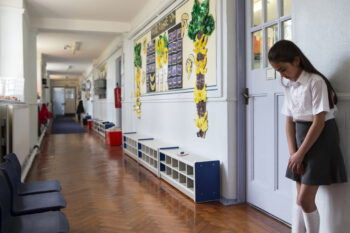 Humanists UK has told the Government it strongly supports proposed changes to the law that will make it more difficult for illegal religious schools to operate. In a response to the Regulating Independent Educational Institutions consultation, Humanists UK said it welcomed proposals that will make it easier to inspect, close, and prosecute the providers of illegal religious schools, but expressed concern that, to date, progress on the issue has been far too slow.
Humanists UK has told the Government it strongly supports proposed changes to the law that will make it more difficult for illegal religious schools to operate. In a response to the Regulating Independent Educational Institutions consultation, Humanists UK said it welcomed proposals that will make it easier to inspect, close, and prosecute the providers of illegal religious schools, but expressed concern that, to date, progress on the issue has been far too slow.
The consultation sought to establish views on three key changes to the law regulating independent schools:
- Widening the range of educational setting that must register with the Department for Education and establishing a legal definition of ‘full time’ education;
- Giving the Government additional powers to change the law if providers are found to be using legal loopholes to continue to deny pupils a broad and balanced education;
- Changing the way the deregistration process works so that independent schools that continually fail inspections can be tackled more quickly.
Humanists UK, which has led the national campaign for action on unregistered religious schools for many years, has repeatedly called for such changes alongside additional powers for school inspectorate Ofsted to ensure it can seize evidence and shut down settings operating outside the law. Its work exposing the plight of children in illegal schools led to the creation of Ofsted’s unregistered schools team, with a 2019 Ofsted report finding that 6,000 children were at potential risk in these settings, many of which operate in appalling conditions with a complete lack of safeguarding.
When they have a faith character, unregistered ‘schools’ tend to provide pupils with a narrow curriculum focused on the study of religious texts and are often fundamentalist, extreme, or isolationist in their outlook. However, loopholes in the current law allow settings that do not provide their pupils with an education that is ‘suitable’ for pupils of primary or secondary age to claim they are not schools and avoid proper regulation and oversight, effectively rewarding them for their bad practice. Many full-time institutions also insist they are actually part-time educational settings providing supplementary lessons for home-educated children, which are similarly unregulated.
In addition to the latest proposals, last year, Humanists UK welcomed the Government’s move to introduce a compulsory register of home-educated students that should help to ensure vulnerable children are no longer able to slip through the regulatory cracks between different types of provision.
Humanists UK Education Campaigns Manager Ruth Wareham said:
‘It is great to see the Government finally taking action to close the legal loopholes that have so far allowed unregistered religious schools to operate with impunity. For many years, we have been calling for there to be a statutory definition of full-time education and for settings that provide all or most of their pupils’ education to be regulated, even if they only teach a narrow religious curriculum.
‘These proposals aren’t perfect – we believe part-time settings should also be properly regulated, and that an 18 hour threshold for registration as a full-time setting is far too high – but nevertheless these changes are a huge step in the right direction.
‘Now the Government needs to act swiftly to ensure that all the children currently at risk in illegal, unregistered schools receive their entitlement to a broad and balanced education in a safe environment.’
Notes:
For further comment or information, please contact Humanists UK Education Campaigns Manager at press@humanists.uk or phone 020 7324 3000 or 0772 511 0860.
Read our full consultation response.
Read our latest article on why Government must move fast in crackdown on illegal schools
Read more about Ofsted’s frustration on Government inaction on illegal schools.
Read more about Humanists UK’s response to Ofsted’s 2019 illegal schools report.
Read more about our work on illegal schools.
Humanists UK is the national charity working on behalf of non-religious people. Powered by over 85,000 members and supporters, we advance free thinking and promote humanism to create a tolerant society where rational thinking and kindness prevail. We provide ceremonies, pastoral care, education, and support services benefitting over a million people every year and our campaigns advance humanist thinking on ethical issues, human rights, and equal treatment for all.
